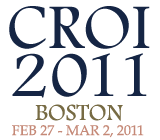 There is no association between the use of ViiV Healthcare’s nucleoside analogue abacavir—found in Ziagen, Epzicom and Trizivir—and heart attack risk, according to a new analysis conducted by the U.S. Food and Drug Administration (FDA), reported Monday, February 28, at the 18th Conference on Retroviruses and Opportunistic Infections (CROI) in Boston.
There is no association between the use of ViiV Healthcare’s nucleoside analogue abacavir—found in Ziagen, Epzicom and Trizivir—and heart attack risk, according to a new analysis conducted by the U.S. Food and Drug Administration (FDA), reported Monday, February 28, at the 18th Conference on Retroviruses and Opportunistic Infections (CROI) in Boston.
In February 2008, at the 15th CROI, also held in Boston, a review of data from the Data Collection on Adverse events of Anti-HIV Drugs (D:A:D) study indicated that abacavir was associated with a 90 percent increase in the risk of a heart attack. Six months later, data from the Strategies for Management of Antiretroviral Therapy (SMART) study pointed to a quadrupled risk of a heart attack among those using abacavir. Other analyses seemed to confirm these findings, whereas others failed to document any connection between past or present abacavir use and heart attack risk.
Despite the conflicting data, Epzicom—once listed as a “preferred” nucleoside reverse transcriptase inhibitor for use in combination with other antiretrovirals in first-time treatment regimens—was stripped of its preferential ranking by the U.S. Department of Health and Human Services in the November 2008 issue of the federal treatment guidelines, partly because of its possible association with an increased risk of heart attacks.
The FDA has now chimed in with an analysis of its own. The agency’s investigators—known for their strict review of data—analyzed the results of 26 randomized clinical trials involving abacavir. Cohorts, including D:A:D, were not included in the agency’s review, given that it is difficult to adjust data from these studies for confounders (documented and undocumented factors that can skew outcomes).
All studies were conducted between 1996 and 2010 and involved 16 pharmaceutical company clinical trials, five AIDS Clinical Trials Group studies and five studies conducted at academic centers. A total of 9,832 patients were included in the analysis: 5,028 of whom received abacavir, and 4,804 of whom received a competing agent.
A total of 25 heart attacks were documented among those taking abacavir, compared with 22 of those not taking abacavir. According to statistical analyses conducted by the FDA, the difference in heart attack risk between the two groups was negligible and not statistically significant.
Even when the agency excluded clinical trials in which no heart attacks were reported—18 studies had at least one report of a heart attack—there was no statistically significant difference between those taking abacavir and those not using the drug.
“A meta-analysis conducted by the FDA based on [randomized controlled trials] did not show an association between increased risk of [heart attacks] and use of [abacavir],” the study authors wrote. They added that only a new clinical trial, specifically looking at heart attack rates among those using abacavir-inclusive regimens compared with those using non-abacavir drug combinations, can settle this controversy once and for all.






Comments
Comments